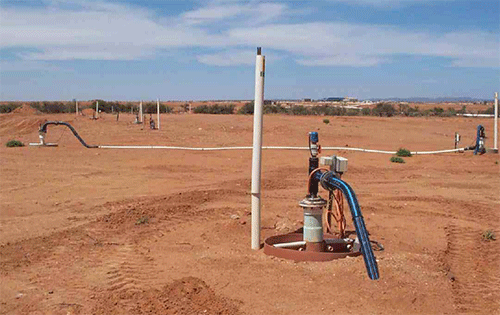Russian mining company Uranium One Group has withdrawn a case against the water ministry for not issuing exploration drilling permits to them.
However, Uranium One and by extension its local subsidiary remain confident their project will eventually get the green light, and they maintain their proposed mining extraction method is safe and can be beneficial to Namibia.
In late 2022, agriculture, water and land reform minister Calle Schlettwein took a firm stance that no uranium mining would be approved in the Leonardville area to safeguard the quality of scarce groundwater resources.
He had asked Uranium One to present scientific evidence to show no contamination of underground water would occur if the company was granted permission to continue with uranium exploration.
Headspring Investments is the Namibian subsidiary of Uranium One, which in turn is part of the Russian state-owned nuclear energy company Rosatom.
Due to the legal challenge, Headspring’s exploration has been halted for some time. The mining company has proposed using ISL, also called in-situ recovery (ISR) or solution mining, as the preferred extraction process. This method is generally used to recover minerals such as copper and uranium through boreholes drilled into a deposit.
However, Schlettwein stated that the ministry’s policy position is that no mineral exploration drilling and in-situ leaching activities shall occur in any aquifer.
Headspring Investment approached the High Court in 2023 on the matter as an applicant, where 39 parties were cited as respondents.
These included the ministers of agriculture, water and land reform; mines and energy; environment, forestry and tourism; director of the department of water affairs; chairperson of the advisory water board of Namibia; the mining commissioner; the government of Namibia; Aminuis Village Council; Leonardville Village Council; up to 38 individual farmers; as well as the environmental commissioner.
Headspring Investments based its court challenge on Article 18 of the Namibian Constitution, which states:
“Administrative bodies and administrative officials shall act fairly and reasonably, and comply with the requirements imposed upon such bodies and officials by common law and any relevant legislation, and persons aggrieved by the exercise of such acts and decisions shall have the right to seek redress before a competent court or tribunal.”
Meanwhile, Uranium One and its subsidiary withdrew the application because during August 2023, the Water Resources Management Act, Act 11 of 2013 (‘the Act’), was operationalised by the agriculture, water and land reform minister. This is despite the Act having been in existence since 2013.
This legislation has introduced material changes to the previously exiting legal landscape, and as such the company decided to withdraw the case.
This Act provides for the management, protection, development, use and conservation of water resources; provides for the regulation and monitoring of water services; and provides for incidental matters.
“Uranium One is confident that the project will hold great benefits for the country, and that the whole process of exploration, test mining (which is part of exploration) and eventual mining of the uranium will be absolutely safe, with the minimum negative ecological impact,” added the company this week. -mndjavera@nepc.com.na


